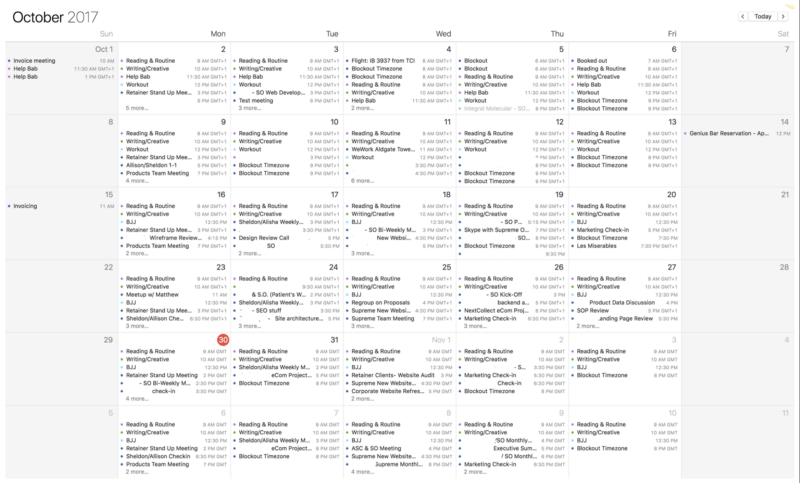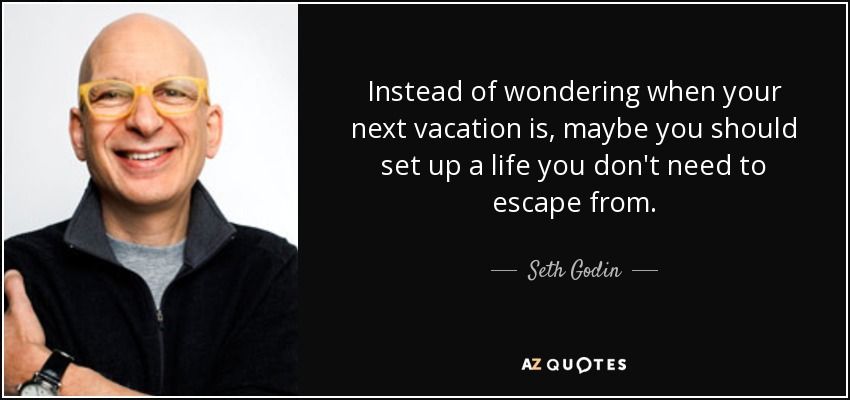
Many times people just tell you to work harder, to put in longer hours, and that’s how you get more stuff done. The problem with this mentality is that you’ll forever be competing with other people who just work longer hours, but there are only 24 hours in a day.
My entire life I’ve had to juggle multiple projects at once with a high success rate, whether it was maintaining an almost perfect GPA in college with a social life, volunteering, tutoring, and extracurriculars or building a seven-figure business while growing a successful acting career.
I’ve learned a lot on how to be more efficient, how to work smarter and get more things done. Here are the 11 most important tips:
1. Morning Journaling and Prioritization
Each morning, do a full mental dump into a simple journal whether it be written long-hand or typed out on a computer. Write about whatever is on your mind. Usually what comes out are things that make you anxious or stressed out. The things that make you the most anxious and stressed are the things you need to address first.
Make a list of these things at the end and then prioritize the one thing that you need to get done today. Usually the most important thing is also the most mentally challenging. You need to be extremely focused and distraction-free for this time.
Keep this daily checklist somewhere (I prefer Wunderlist), and check things off as you go. I don’t like to keep my mind full of things that I need to do because it takes up my brain power. I want to free my brain from as much “remembering to do things” as I can. I store these digitally so when I’m done with one task, I just look at the list, and know exactly what else I need to get done.
“Every morning, set your clock one-half hour early; get up and write three pages of longhand, stream-of-consciousness morning writing. Do not reread these pages or allow anyone else to read them. Ideally, stick these pages in a large manila envelope, or hide them somewhere. Welcome to the morning pages. They will change you.” Julia Cameron, The Artist’s Way
The small administrative tasks and errands that you have to do, you should do after you complete your one high-priority task. Usually those smaller things don’t take as much concentration, and even if they do, you can complete them on a lower mental willpower level.
For example, if I’m already mentally exhausted and burnt out, I am not going to be able to compete a big project, essay, or other assignments. Alternatively, if I’ve already completed the bigger task, I can easily still have the mental energy to book a plane ticket, or go to the store and buy some groceries, because that doesn’t take much concentration, and can sometimes be quite enjoyable.
Also oftentimes during the day, you’ll have downtime whether it is during a commute, or sitting in a friends car, or sitting on the toilet. Just do all the other small things during that time, and keep your work time focused on work. If you want to see a visual of how this works, check out this video.
2. Routine
We are creatures of routine. Get a great routine because humans can only make so many decisions in one day before they start to get tired out.
If you need to make a decision every single day on what you are going to eat, where you are going to go, what you are going to do, then you waste those decision making points so when you need to make the big decisions for your work, school, or anything else, you’ll already be worn down. Additionally, there is so much time wasted in deciding some of these menial things.
Just make a decision, quick and easy, and run with it.
3. Plan Your Day Out Tightly
“When you spend the early hours energizing yourself, you get pulled through the rest of the day with little additional effort.” — Gary Keller, The ONE Thing
A friend of mine who is now on his way to becoming a doctor always had so much going on, from extracurriculars to doing well in school to hobbies and more. I asked him how is he able to balance so many things. He told me that he always puts as much as he can into his schedule, and continues to do so until he starts noticing that he’s performing worse than he wants to.
If you don’t push your limits, you’ll never know just how much time can expand and how much faster you can work to get more done.

How I plan my days using iCal. Idea and credit goes to Noah Kagan and his OkDork blog.
4. Before Getting Too Deep Into Details, Think Big Picture
Sometimes we get so caught up in the details, we forget about the bigger goals and if there’s a better way to achieve the same results in less time.
A great example is going to the gym to work out. So often, we’re told to do a set of standard exercises, one muscle group at a time, or to run on the treadmill for hours.
Then I started to realize, what if I could achieve the same results in a third of the time? Instead of doing bicep curls, then bench presses, then squats, what if I just did compound lifts that work the entire body at a higher intensity?
What if instead of running, I did rowing which allows me to work the entire body and spike my heart rate up way faster than running?
Or even better, why don’t I join a Brazilian Jiu Jitsu class where I can work out my entire body, competitively push my limits against other peers, while learning self defense and training my intellect? That’s knocking down 4 birds with 1 stone.
There’s a million ways to get to a goal — always take a step back and check whether the way you’re going is the best way to get there.
5. Plan Downtime for Uptime
During the day you will have downtime where you are walking somewhere, driving, cleaning, or anything else. Oftentimes we have a hard time incorporating reading into our daily schedules. A great way to get the hours in and constantly be learning is through making use of your downtime with planned uptime.
Absorb new ideas and knowledge by listening to audiobooks while you are doing other activities that don’t require such concentration. Get started easily on Audible or Podcasts — there’s so much to choose from. One of my personal favorite podcasts is the Joe Rogan Experience.
6. Focused Efforts
Work with focus when you work, play with focus when you play.
This means when you sit down to work, make sure that you are in your optimal environment, free of distractions that fragment your concentration.
Otherwise every single time you get deep into complex ideas, someone might distract you and make you lose your train of thought. It generally takes some time to get on a certain wavelength of concentration, and you risk wasting that time trying to refocus when people bring you out of it.
For a long time I liked to work at cafes or in the most social places because I enjoyed getting distracted. More and more, I realized that the times that I was alone and focused, my productivity would increase by significant amounts and I was able to complete more quality work in less time.
“High-Quality Work Produced = (Time Spent) x (Intensity of Focus)” — Cal Newport, Deep Work
The same goes for when you are out with friends. Let this time and your attention be purely focused on relaxing and not work. Otherwise you end up always feeling like you are not fully concentrating when you’re working, and working when you’re supposed to be disconnecting.
7. Know The Value of Your Time
What is your time valued at? When I was young, I only made about $7/hr working in the food service industry as a busboy, or sandwich artist. I understood the concept of only having a limited number of hours in a day, and that I needed to invest those hours into building skill sets that could allow me to eventually make more than $7/hr.
I knew my time was more valuable than that, and I was determined to find a way to make it happen. I figured that as a college student, I could either spend those hours on studying and achieving extremely high grades but accumulating student loans, or I could work and not collect loans.
I chose to spend my time on building skill sets to increase the hourly rate I could eventually bill at and opted to take on student debt. Additionally, due to the vast array of scholarships available, I also understood that if I studied very hard and put in the same amount of time towards my grades as people put into 8-hour-a-day shifts for something like $60, I could get better grades than 90% of people and open myself up to an array of academic scholarships which, in essence, are your reward for working hard.
In the end, not only did I get an almost perfect GPA through my college years, which set me up to increase the eventual hourly rate I could make, but I also got a number of sizable academic scholarships, which were more than I could have earned working $7/hr. In fact, given the amount of time I studied and earned those grades, if I calculated it out, I would have been “earning” something much higher than $7/hr. Getting paid to study is a win.
Now, applying these same concepts as I made more money per hour, I was able to better prioritize what I should be focusing my efforts on. For example, when I started making $25/hr, I made decisions based off whether I should be wasting hours trying to save a few bucks, or should pay a bit more and save my time because it was worth more.
Today, I generally bill clients somewhere around $400/hour but value my time even higher than this because I drive the growth of a business. Things start to be a lot more clear in terms of where I should be spending time and energy trying to save a bit of money.
This allows me to make decisions quickly such as: should I clean my own house or hire someone to clean at $15/hr? Should I be the one sorting this Excel sheet or should I pay someone to do it? Although it might seem “posh” or “lazy” that I won’t do some of those tasks, in essence, I am simply paying someone else who can do a better job than I can, so I can spend my time on something I’m the best at to earn the highest returns.
One important note: time you enjoy wasting is not time wasted. When I am just taking a nice walk or hiking a mountain, I don’t assign monetary values to this time spent. You work hard to make money, so enjoy it.
8. Spend Money Now to Save Money Later
The rich get richer. It’s simple because the higher you rise in salary and class, the more people you meet who can offer you grander opportunities. It is self-perpetuating. Not only this, but the more rich you become, the more you can make investments in yourself that allow you to use money to make money.
- Some of these investments might be:
- Software that makes you more productive.
- Courses and seminars that teach you new skills.
- A faster laptop and two screens that never freezes and is blazing fast.
- Access to airport lounges so you can be productive while traveling.
As you make more money, it starts becoming easier and easier to make even more.
Investing in yourself is the most important investment you’ll ever make in your life. . . . There’s no financial investment that’ll ever match it, because if you develop more skill, more ability, more insight, more capacity, that’s what’s going to really provide economic freedom.” — Warren Buffet
9. Napping for Emotional Energy Resetting
Yes. Napping.
If you have time each day to work in a quick 15-minute power nap, I find that it dramatically increases my productivity. It serves almost as a ”reboot,” resetting and recharging my ability to focus, and resetting my emotional energy to tackle challenging tasks. Combine this nap with a cup of coffee upon waking, and you’ll feel ready to conquer any challenges that you’d been dreading, whether it’s going to the gym or starting another big important task.
10. Start Measuring Where You Are Wasting Time
Observe yourself, and find out when you are wasting time. I waste the most time getting from place to place, laying in bed on my iPhone browsing through social media, debating about meaningless topics that don’t result in anything tangible, and more.
Sometimes you waste a lot of time with people who you don’t particularly enjoy spending time with, but hang out with anyways, as a way to distract from being bored.
Other times, it might involve going out every single weekend, and then spending the day recovering. Identify those time drains and rid yourself of them.
The best way to identify if you are wasting time is to ask yourself if you’re happy afterwards and if you’ve gotten any closer to achieving your bigger goals.
11. Build Stamina
Stamina is an important goal to work towards. Just like when you are in the gym and you’re able to push your limits more and more as you progress, the same goes for productivity.
As you challenge yourself to focus, to accomplish just a little bit more in one day, your ability to focus will expand, as will your willpower to get more done and tackle anything in your way. Push yourself and see how many important tasks you can get done in one day.
Start with just a few of these tips to begin with. You don’t need to apply all of them at once. In fact, just start with the easiest— in my opinion #9: Napping is a good one to just get your foot in the door. And with that, I leave you with a quote for action:
“Mastery doesn’t come from an infographic. What you know doesn’t mean shit. What do you do consistently?” — Tony Robbins
If you ever have questions, comments, or just want to chat, drop me a message feel free to email me at [email protected]. Also, make sure to checkout the full website at WhyYouNoDoctor.com for a stream of new posts. I’m here to support you in achieving your goals.
P.S. if you liked this article be sure to click the clap or share it with your friends!


